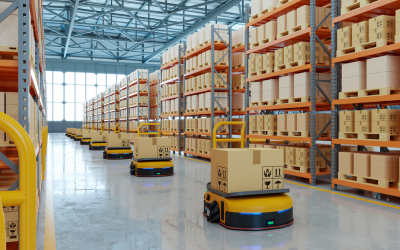Highlights:- Logistics Department Structure: Understand the organizational layout, roles, and
responsibilities within a logistics department. - Logistics Functions: Learn the core functions such as i...
Highlights:
- Logistics Department Structure: Understand the organizational layout, roles, and
responsibilities within a logistics department. - Logistics Functions: Learn the core functions such as inventory management, warehousing, transportation, and order fulfillment. - Team Management: Master effective management techniques for logistics teams and cross- department collaboration. - Technology in Logistics: Discover the role of technology, such as TMS and WMS, in optimizinglogistics operations.
Course Objective:
By the end of this course, you will be able to: - Understand the structure, roles, and responsibilities within a logistics department. - Effectively manage key logistics functions like transportation, warehousing, inventory
management, and order fulfillment. - Implement strategies to optimize the performance of the logistics department. - Use technology and systems to streamline logistics operations and improve efficiency. - Develop and manage logistics teams to ensure high-quality service and performance. - Address challenges in logistics operations, including cost control and process improvements.
Course Structure:
1. Introduction to Logistics Department Management
- Overview of the logistics department's role in an organization
- Key components of a logistics department: Transportation, warehousing, inventory
management, order fulfillment
- The importance of logistics in the supply chain and business success
- The interconnection between the logistics department and other business functions (e.g., sales, procurement, customer service)
2. Logistics Department Structure
- Organizational structure of a logistics department
- Key roles and responsibilities: Logistics manager, warehouse supervisor, transportationcoordinator, inventory planner
- Reporting lines and collaboration with other departments (finance, operations, HR) - Skills and competencies required for logistics personnel
3. Transportation Management
- Understanding transportation roles within the logistics department
- Planning and managing transportation strategies (mode selection, route planning) - Key factors affecting transportation decisions: Cost, speed, reliability, and capacity
- Managing transportation vendors and third-party logistics providers (3PLs)
4. Inventory and Warehouse Management
- Role of inventory management in logistics: Stock control, ordering, and replenishment
- Warehouse management responsibilities: Space optimization, receiving, picking, packing, shipping
- Inventory systems: FIFO, LIFO, JIT, and cycle counting
- Managing warehouse layouts and operational efficiency
- Implementing best practices in storage and safety protocols
5. Order Fulfillment and Customer Service
- Understanding the order fulfillment process: Order receipt, picking, packing, and shipping
- Managing order cycle times and meeting delivery deadlines
- Improving customer satisfaction through timely deliveries and accurate order processing- Handling returns and reverse logistics
- Managing customer service in logistics and ensuring service-level agreements (SLAs) aremet
6. Logistics Technology and Tools
- Key technologies used in logistics: TMS (Transportation Management Systems), WMS
(Warehouse Management Systems), and ERP (Enterprise Resource Planning) - Real-time tracking and monitoring tools for inventory and shipments
- Role of automation and robotics in modern logistics
- Using data analytics to optimize logistics performance and decision-making
- The impact of IoT (Internet of Things) on logistics and tracking systems
7. Cost Management and Efficiency
- Managing logistics costs: Transportation, warehousing, inventory holding costs, and order
fulfillment
- Cost-saving strategies in logistics operations: Outsourcing, optimizing routes, automation,
lean practices
- Budgeting and financial control within the logistics department
- Measuring and improving logistics performance: Key performance indicators (KPIs) andmetrics
8. Risk Management and Compliance
- Identifying and managing risks in logistics operations: Delays, damages, inventory shrinkage, and supply chain disruptions
- Ensuring compliance with local and international regulations: Customs, safety, and
environmental standards
- Managing insurance and claims related to logistics operations
- Disaster recovery and contingency planning in the logistics department
9. Managing the Logistics Team
- Best practices for recruiting and training logistics staff - Team management: Effective leadership, motivation, and performance monitoring
- Developing a positive work culture within the logistics department
- Cross-functional collaboration with other departments (sales, procurement, IT) - Addressing challenges in team performance and conflict resolution
Learning Methodology:
- Interactive Lectures: Learn through structured lessons led by logistics professionals and industryexperts. - Hands-on Practice: Work with case studies, examples, and real-time data to understandlogisticsdepartment operations. - Assessments and Quizzes: Regular assessments to evaluate understanding and reinforce
learning. - Live Sessions: Participate in live Q&A sessions for clarification and support. - Discussion Forums: Engage with peers and instructors to discuss challenges and solutions inlogistics management.
Who Should Enroll:
- Logistics managers, supervisors, and coordinators seeking to enhance their department
management skills
- Supply chain professionals who want to specialize in logistics operations
- Business owners and entrepreneurs looking to optimize logistics within their organizations
- HR and operations managers involved in the recruitment, training, and management of logisticsstaff - Students pursuing careers in logistics, supply chain management, or operations management
- Anyone interested in understanding and managing the logistics department within an
organization
This Logistics Department Management course is essential for anyone looking to master thelogistics function within an organization. Whether you are a logistics professional, business
owner, or student, this course will provide you with the tools and knowledge necessary tomanage a logistics department effectively, optimize processes, and enhance operational
efficiency across your supply chain.






